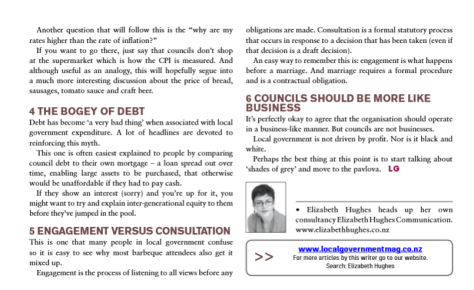Here are three items introducing the Delphi Technique, used globally in those meetings where you’re consulted, yet you still feel railroaded and haven’t been heard at all. It’s not your imagination. This is a real eye opener. It’s how their agenda (Agenda 21/30) is carried out without your knowing. Hence all the public-excluded meetings these days when they discuss the real agenda with the chosen few. If you’re not on their page you’ll be excluded. And Councils use this technique it when ‘consulting’ you. On the public stuff, making you think you’ve had input. Do read these articles, they’re not too long. The definition of consultation for LG’s own magazine tells you the decision’s already been made, then your views are sought. Excerpt below… ‘5. Engagement vs Consultation’:

First article by Lyn Stuter
The Delphi Technique was originally conceived as a way to obtain the opinion of experts without necessarily bringing them together face to face. In Educating for the New World Order by Bev Eakman, the reader finds reference upon reference for the need to preserve the illusion that there is “Lay, or community, participation in the decisionmaking process), while in fact lay citizens are being squeezed out.”
A specialized use of this technique was developed for teachers, the “Alinsky Method” (ibid., p. 123). The setting or group is, however, immaterial the point is that people in groups tend to share a certain knowledge base and display certain identifiable characteristics (known as group dynamics). This allows for a special application of a basic technique. The “change agent” or “facilitator” goes through the motions of acting as an organizer, getting each person in the target group to elicit expression of their concerns about a program, project, or policy in question. The facilitator listens attentively, forms “task forces,” “urges everyone to make lists,” and so on. While she is doing this, the facilitator learns something about each member of the target group. He/she identifies the “leaders,” the “loud mouths,” as well as those who frequently turn sides during the argument the “weak or noncommittal.”
Suddenly, the amiable facilitator becomes “devil’s advocate.” He/she dons his professional agitator hat. Using the “divide and conquer” technique, he/she manipulates one group opinion against the other. This is accomplished by manipulating those who are out of step to appear “ridiculous, unknowledgeable, inarticulate, or dogmatic.” He/she wants certain members of the group to become angry, thereby forcing tensions to accelerate. The facilitator is well trained in psychological manipulation. S/He is able to predict the reactions of each group member. Individuals in opposition to the policy or program will be shut out of the group.
The method works. It is very effective with parents, teachers, school children, and any community group. The “targets” rarely, if ever, know that they are being manipulated. If they do suspect this is happening, they do not know how to end the process. The desired result is for group polarization, and for the facilitator to become accepted as a member of the group and group process. He/she will then throw the desired idea on the table and ask for opinions during discussion. Very soon his/her associates from the divided group begin to adopt the idea as if it were their own, and pressure the entire group to accept the proposition.
READ MORE:
https://seanet.com/~barkonwd/school/DELPHI.HTM
A further article on the Delphi Technique by Abert V Burns
Let’s Stop Being Manipulated
More and more, we are seeing citizens being invited to “participate” in various forms of meetings, councils, or boards to “help determine” public policy in one field or another. They are supposedly being included to get ”input” from the public to help officials make final decisions on taxes, education, community growth or whatever the particular subject matter might be.
Sounds great, doesn’t it? Unfortunately, surface appearances are often deceiving.
You, Mr. or Mrs. Citizen, decide to take part in one of these meetings.
Generally, you will find that there is already someone designated to lead or “facilitate” the meeting. Supposedly, the job of the facilitator is to be a neutral, non-directing helper to see that the meeting flows smoothly.
Actually, he or she is there for exactly the opposite reason: to see that the conclusions reached during the meeting are in accord with a plan already decided upon by those who called the meeting.
The process used to “facilitate” the meeting is called the Delphi Technique. This Delphi Technique was developed by the RAND Corporation for the U.S. Department of Defense back in the 1950s. It was originally intended for use as a psychological weapon during the cold war.
However, it was soon recognized that the steps of Delphi could be very valuable in manipulating ANY meeting toward a predetermined end.
How does the process take place? The techniques are well developed and well defined.
First, the person who will be leading the meeting, the facilitator or Change Agent must be a likable person with whom those participating in the meeting can agree or sympathize.
It is, therefore, the job of the facilitator to find a way to cause a split in the audience, to establish one or a few of the people as “bad guys” while the facilitator is perceived as the “good guy.”
Facilitators are trained to recognize potential opponents and how to make such people appear aggressive, foolish, extremist, etc. Once this is done, the facilitator establishes himself or herself as the “friend” of the rest of the audience.
The stage is now set for the rest of the agenda to take place.
At this point, the audience is generally broken up into “discussion—or ‘breakout’—groups” of seven or eight people each. Each of these groups is to be led by a subordinate facilitator.
Within each group, discussion takes place of issues, already decided upon by the leadership of the meeting. Here, too, the facilitator manipulates the discussion in the desired direction, isolating and demeaning opposing viewpoints.
READ MORE
http://www.vlrc.org/articles/110.html
And finally, a video showing how to derail the Delphi Technique
Published on Oct 29, 2014


You must be logged in to post a comment.